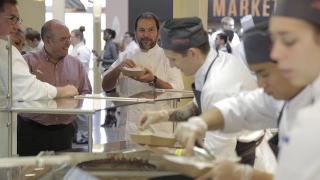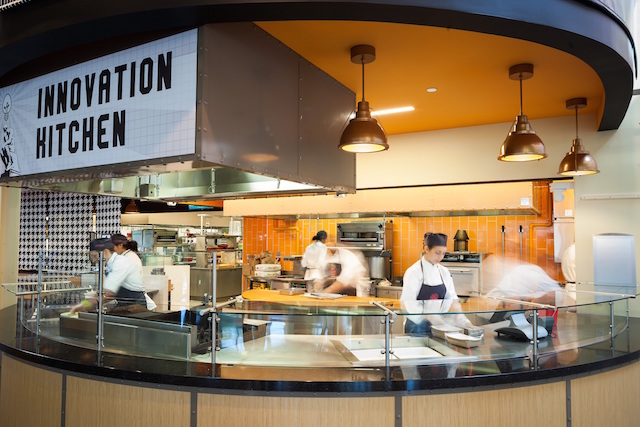
Business-Innovation Students at CIA Launch Restaurant Concept
23 September 2015Leyenda opens as the capstone project of The Culinary Institute of America’s “intrapreneurship” academic concentration, which aligns the business part of a restaurant with the ability and love of cooking professionally.
With the opening of the Leyenda quick-service Mexican concept on Sept. 14, the first class of The Culinary Institute of America’s Intrapreneurship academic concentration began the new semester by putting its business-innovation ideas into practice. Leyenda serves the campus community as one of several dining options in the college’s new dining venue, The Egg.
In contrast to “entrepreneurship,” which requires creating one’s own business, intrapreneurship involves business innovation from within an existing organization. This new CIA program is for juniors and seniors pursuing their bachelor's degrees in management.
 “Other than securing financing, this concentration helps students develop all the skills necessary to be entrepreneurs,” says Dr. Annette Graham, associate dean of business management at the CIA. “Students have an opportunity to participate in all phases of restaurant development. Working in groups, they must create a concept appealing to fellow students, faculty and staff. This is additionally challenging because of the discerning palates of their peers.”
“Other than securing financing, this concentration helps students develop all the skills necessary to be entrepreneurs,” says Dr. Annette Graham, associate dean of business management at the CIA. “Students have an opportunity to participate in all phases of restaurant development. Working in groups, they must create a concept appealing to fellow students, faculty and staff. This is additionally challenging because of the discerning palates of their peers.”
During their pitch, students in each group must convince a panel of industry experts that their concept is the most compelling in terms of market, taste, uniqueness and potential for profitability and replication. The full class then rallies around the winning pitch. The students have one semester to build the concept into a functioning restaurant, which they actually operate during their final semester of senior year in a class called Intraventure Operations.
Preparation includes developing healthful recipes, focusing on maintaining food cost and streamlining production and service. Each class also markets the restaurant, develops financial reporting documents and human-resource materials, and programs the point-of-sale (POS) system. Each student must put in at least five hours a week working in the restaurant in addition to their other classes.
“Being an entrepreneur is an integral part of becoming a chef,” CIA graduate Enrique Olvera said while sampling the offerings at Leyenda. Olvera is chef/owner of Pujols in Mexico City, ranked No. 16 on the San Pellegrino World’s 50 Best Restaurants list for 2015. “More and more chefs are partners. The business part of a restaurant is inseparable from your dreams of cooking, and the two must align.”
Each semester, a new group of students will open and manage a different concept in the Innovation Kitchen in The Egg. The next concept, Terra Frites, will open in January.
Photo: Students work the line at Leyenda in the Innovation Kitchen at The Culinary Institute of America’s student-dining venue. Creating and running a restaurant concept they develop themselves is the capstone project of the college’s intrapreneurship academic concentration. Courtesy CIA/Phil Mansfield Photo: Celebrated Mexican chef Enrique Olvera ’97, who has one of the top-rated restaurants in the world, samples the offerings at Leyenda. Courtesy CIA/Phil Miller
